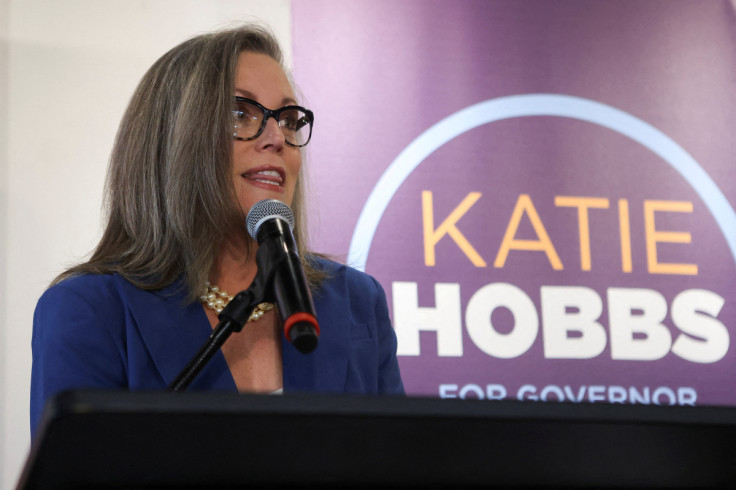
Democratic Arizona Governor Katie Hobbs said Monday she is open to working with President-elect Donald Trump's administration on border security, particularly in combating fentanyl trafficking, but warned: she will not support actions that harm families such as mass deportation.
Speaking during a visit to the Arizona-Mexico border in Nogales, Hobbs praised the state's National Guard efforts in curbing the smuggling of fentanyl, a deadly synthetic opioid. Nogales accounts for over half of all fentanyl seizures along the U.S. border.
"Border security was a core issue of the Trump campaign," Hobbs said. "I look forward to having conversations with the incoming president about Arizona's needs, including border security and the work we've done here to build these partnerships that are actually producing results."
While Hobbs expressed willingness to collaborate, she underscored her opposition to policies she said could harm Arizona communities, including potential mass deportations. Trump has vowed to implement the largest deportation operation in U.S. history, a plan that could affect millions of undocumented immigrants, many with U.S. citizen family members.
"I will not tolerate actions that harm Arizonans, that harm our communities, and quite honestly, divert resources from providing real security at our border," Hobbs said. She refrained from speculating on Trump's plans, saying, "I'm not going to comment on hypotheticals."
Hobbs highlighted Operation Secure, her initiative involving the Arizona National Guard in counterdrug efforts across the state, the Associated Press reported. She added that 170 National Guard members are assigned to these efforts, with 40 stationed in Nogales.
The visit came two weeks after significant Republican wins in Arizona, where Trump defeated Vice President Kamala Harris by about 185,000 votes, and the GOP expanded its majority in the state legislature.
Hobbs emphasized that border security transcends political affiliation. "This is not a Republican or Democratic issue," she said. "I will work with anyone to keep the border safe."
Troy Miller, acting head of U.S. Customs and Border Protection, praised the National Guard's contributions at the Nogales port. "The scope of this problem is too large and the stakes are too high for us to do this work alone," Miller said in the news conference.
Democratic leaders and immigration advocates are preparing legal strategies to counter Trump's promise to deport nearly 11 million undocumented immigrants, a plan that would consider declaring a national emergency and deploying military resources, as Trump himself has pointed out. Trump has suggested declaring a national emergency and deploying military resources to carry out his plan. To support this agenda, he has appointed immigration hardliners to key positions, including former Immigration and Customs Enforcement (ICE) Director Tom Homan as his "border czar" and Stephen Miller, the architect of his first-term immigration policies, as deputy chief of staff for policy.
However, implementing a deportation effort of this scale presents significant logistical, legal, and political challenges, as well as demands far beyond Immigration and Customs Enforcement (ICE)'s current capacity. Such an operation would also have a profound economic impact, potentially reducing the U.S. GDP by as much as 6.8%. Undocumented workers play a critical role in industries like construction and agriculture, where 13.7% and 12.7% of the workforce, respectively, lack legal residency.
A report estimates that deporting all 11 million undocumented immigrants could cost $315 billion and trigger severe labor shortages in key industries. This economic disruption underscores the complexity of executing such a plan on both a practical and financial level.
© 2025 Latin Times. All rights reserved. Do not reproduce without permission.






